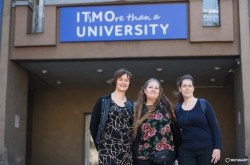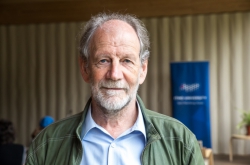About the project
Implemented as part of the 2014-2020 South-East Finland – Russia Cross-Border Cooperation program, BizCycle is aimed at promoting tourism and hospitality entrepreneurship through the development of the cross-border cycling and ecotourism ecosystem. The project implies the creation of itineraries and information services envisaged to help cycling tourists traverse the region in the most comfortable way possible, being catered for by the local enterprises.
BizCycle is a joint collaboration between businesses, research centers and local authorities from both sides of the border. Finland is represented by the companies Cursor Oy and Fruct Oy, Russia by the Committee for Tourism of the Leningrad Oblast and the Tourism Information Center. ITMO University is the leading partner of the project, being responsible for managing and overseeing its implementation.
The project started on November 1, 2018, but it wasn’t until December 7, 2018 that its first public event took place, gathering BizCycle’s partners and representatives of St. Petersburg and the Leningrad Oblast’s cycling community to discuss the project’s main goals and expected outcomes. The region’s cyclists contributed with their suggestions on BizCycle’s development and provided the project’s initiators with other valuable feedback, while partners from South-Eastern Finland shared about their experience of designing biking itineraries and identified the areas for potential collaboration with other projects that are part of the cross-border program.

According to the Cursor Oy representative Taini Rajala, despite the fact that there are similar projects in Finland, they have their faults. The itineraries developed fail to factor in the services provided by local businesses, and the IT solutions used are far from perfect. That’s why BizCycle partners will focus on improving the quality of the cross-border services and overcoming other existing issues, says the expert.
The project’s main stages
BizCycle is planned to last for three years, concluding in 2021. There will be three one-year stages, each starting on November 1 and ending on October 31 of the next year.
“Our idea is to unite the services into one single framework to the cycling tourists’ convenience. Be it before or during their trip, they will be able to use our IT tools, a website and an app included, when deciding where to eat, to make a stop, or to hire a local guide to help them on their way. The local businesses and companies will also benefit from the project as it will increase their customer outreach. The current solutions in the field can’t boast such a comprehensive approach to presenting the information available,” commented Sergey Balandin, President of the Fruct Oy association.

He adds that BizCycle isn’t a one-act project but an umbrella for a wide range of initiatives.
The first one centers on updating and exchanging data on the existing cycling ecosystem by the members of the project group. This includes a review of region’s companies offering services in this field, as well as of the solutions available.
Secondly, there is planned to be a study into the world’s best practices and experience of organizing cycling tourism infrastructure. The project participants have already achieved some results in this direction.
The project’s participants will also hold consultations with local cycling organizations and the business community. This will help them identify the needs of the future users of the BizCycle service.
The obtained findings will be then used for creating solution packages. The project coordinators will try to come up with the best way for displaying each kind of service on offer, ranging from food to rest and accommodation. The ideal solution will allow users to get personalized service recommendations, and businesses to offer additional options.

The project will conclude with a presentation of the finished ICT solution, or, in other words, the set of IT tools that will be offered to the BizCycle users.
ITMO University’s role
Each partner involved in the project has their own task to oversee. For example, some participants will be responsible for developing IT infrastructure, while others will focus on interacting with the business community.
As stated by Dmitry Muromtsev, head of ITMO’s international laboratory ‘Information Science and Semantic Technologies’, the university’s remit includes practically all IT projects for the Russian side of the border, from the development of key information resources to the integration of such data to the mobile app developed by the Finnish partners.
As the leading partner of the project, ITMO is also responsible for overseeing the project’s implementation and reporting on its progress before the program’s steering committee. Among other tasks performed by the university is the cooperation with the representatives of local tourism and hospitality businesses and organization of events: seminars, business trips, and one of the main events of the BizCycle project, a networking day for entrepreneurs from both sides of the Russian-Finnish border.

The Committee for Tourism of the Leningrad Oblast and the Tourism Information Center will be in charge of interacting with regional cycling communities and developing cycling itineraries: the final platform will include no less than three new biking routes. They will also take it upon themselves to set up events aimed at promoting cycling and ecotourism in the Leningrad Oblast and South-East Finland. These will include press tours, cycling races, and volunteering get-togethers for cleaning up the areas along the biking routes.
One of the project’s special features will be using semantic technologies as part of its IT tools. This was unveiled at the December 7 meeting by Dmitry Pavlov, a representative of the VISmart company, which is a resident of ITMO University’s Technopark.
“How can ICT tools be of help to cyclists? First and foremost, it has to be noted that the latter depend on their environment, more so than car drivers do. They need to do a great deal of planning in advance. But it’s a hard task that is not made any easier by the solutions available out there. The tools we’re developing will address that by including a smart semantic kernel which will communicate accurate data to the website, which will be used to plan the trips, and the mobile app, which is to be used during the trips,” noted Dmitry.

The website and app in question will include features for service providers; each of them will have an individual page telling users about their services, much like Booking.com or TripAdvisor. It is also envisaged that BizCycle products will support information exchange with other apps, including those already used by cycling tourists.
“Why do we need semantic technologies? They will allow for flexible searching of data, which means that the information presented to users will always be correct even if requested in natural language. Let’s say that you need to build an itinerary with such and such start and end points, with a condition that you have two kids and are planning to cross the border. The system will build this itinerary, whilst also suggesting you a couple of alternatives and factoring in your needs. And it is this personalized approach that makes it unique compared to other solutions,” highlighted Dmitry Pavlov.
Prospects for the project

The project’s program also includes plans for organizing a bike ride and a wide range of other events aimed at interacting with the cycling community. The project’s participants say that they are always willing to talk to the community and hear out their suggestions on how the solutions can be improved.
“The main goal of the project is establishing the ecosystem for the development of small-scale tourism, such as cycling and ecotourism, as well as for supporting small enterprises in the border region between the Leningrad Oblast and South-East Finland. What we want to get as a result is enhanced cooperation within the region, better infrastructure, and new opportunities for tourists and businesses alike. Such a cooperation will be supported and developed through the provision of information services, on one part, and the creation of an association of small enterprises and cyclists who will use these services, on the other. These are large-scale results which call for in-depth research and encompass the whole life cycle of information services,” concluded Dmitry Muromtsev.





